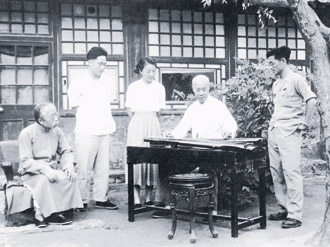Prince Fu on:
[Wikipedia]
[Google]
[Amazon]
 Prince Fu of the Second Rank, or simply Prince Fu, was the title of a princely peerage used in China during the
Prince Fu of the Second Rank, or simply Prince Fu, was the title of a princely peerage used in China during the
 Prince Fu of the Second Rank, or simply Prince Fu, was the title of a princely peerage used in China during the
Prince Fu of the Second Rank, or simply Prince Fu, was the title of a princely peerage used in China during the Manchu
The Manchus (; ) are a Tungusic peoples, Tungusic East Asian people, East Asian ethnic group native to Manchuria in Northeast Asia. They are an officially recognized Ethnic minorities in China, ethnic minority in China and the people from wh ...
-led Qing dynasty
The Qing dynasty ( ), officially the Great Qing, was a Manchu-led Dynasties of China, imperial dynasty of China and an early modern empire in East Asia. The last imperial dynasty in Chinese history, the Qing dynasty was preceded by the ...
(1644–1912). As the Prince Fu peerage was not awarded "iron-cap" status, this meant that each successive bearer of the title would normally start off with a title downgraded by one rank ''vis-à-vis'' that held by his predecessor. However, the title would generally not be downgraded to any lower than a ''feng'en fuguo gong'' except under special circumstances.
The first bearer of the title was Yihui (奕譓; 1845–1877), the Daoguang Emperor
The Daoguang Emperor (16 September 1782 – 26 February 1850), also known by his temple name Emperor Xuanzong of Qing, personal name Mianning, was the seventh List of emperors of the Qing dynasty, emperor of the Qing dynasty, and the sixth Qing e ...
's ninth son, who was granted the title "Prince Fu of the Second Rank" by his father in 1850. The title was passed down over three generations and held by four persons.
Members of the Prince Fu peerage
* Yihui (奕譓; 15 Nov 1845 – 22 Mar 1877; 1st), theDaoguang Emperor
The Daoguang Emperor (16 September 1782 – 26 February 1850), also known by his temple name Emperor Xuanzong of Qing, personal name Mianning, was the seventh List of emperors of the Qing dynasty, emperor of the Qing dynasty, and the sixth Qing e ...
's ninth son, held the title Prince Fu of the Second Rank from 1850 to 1877, posthumously honoured as Prince Fu Jing of the Second Rank (孚敬郡王)
**(a) Zaipei (載沛; 31 Mar 1872 – 23 Aug 1878; 2nd), initially named Zaihuang (載煌), Yidong's (a member from Prince Yu (愉)) sixth son and Yihui's adopted son, succeeded Yihui in 1877 as a ''beile''
**(a) Zaishu (載澍; 8 Nov 1870 – after 1909; 3rd), initially named Zaiji (載楫), Yizhan's (a member from Prince Zhi (直)) son and Yihui's adopted son, held the title of a ''beile'' from 1878 to 1897, his title stripped in 1897. His consort was 3rd daughter of Zhaoxiang, a younger brother of Empress Dowager Cixi
Empress Dowager Cixi ( ; 29 November 1835 – 15 November 1908) was a Manchu noblewoman of the Yehe Nara clan who effectively but periodically controlled the Chinese government in the late Qing dynasty as empress dowager and regent for almost 50 ...
. He had two daughters.
**N/A
***(a) Pujin (溥伒; 30 Aug 1893 – 1966; 4th), Zaiying's (a member from Prince Dun) eldest son and Yihui's adopted grandson, held the title of a ''beizi'' from 1897 to 1945. He was missing with his daughter during Cultural Revolution
The Cultural Revolution, formally known as the Great Proletarian Cultural Revolution, was a Social movement, sociopolitical movement in the China, People's Republic of China (PRC). It was launched by Mao Zedong in 1966 and lasted until his de ...
.
****1 & 2 Yuquan (毓㟫) & Yuyan (毓巘)
Family tree
Legend: * - Title bearers * - EmperorsSee also
*Royal and noble ranks of the Qing dynasty
The Qing dynasty (1644–1912) of China developed a complicated peerage system for royal and noble ranks.
Rule of inheritance
In principle, titles were downgraded one grade for each generation of inheritance.
* Direct imperial princes wit ...
* Prince Dun
* Prince Zhi (直)
* Prince Yu (愉)
References
* {{DEFAULTSORT:Fu, Prince Qing dynasty princely peerages